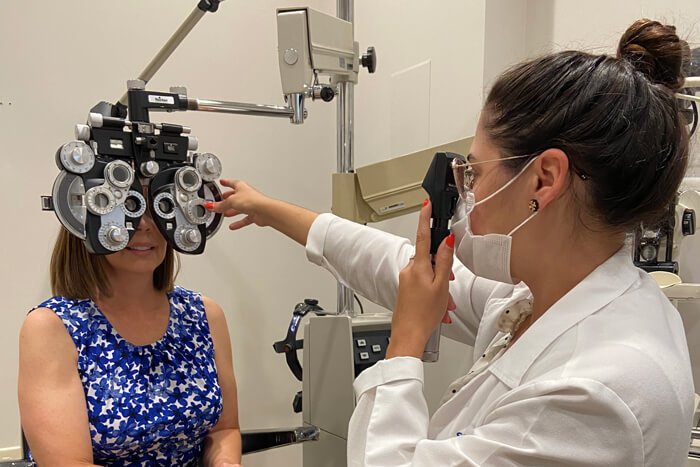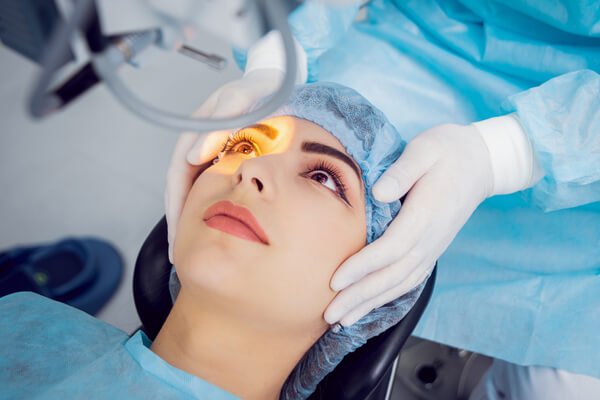Regular eye check-ups are crucial for maintaining optimal vision and eye health. If you’re searching for an “eye doctor near me,” you’re taking an important step toward safeguarding your eyesight. Whether you need a routine eye exam, prescription glasses, contact lenses, or treatment for an eye condition, choosing the right eye doctor is essential. This article will guide you through the process of finding a reliable eye doctor near you, the different types of eye care professionals, what to expect during an eye exam, and tips for keeping your eyes healthy.
Why Should You Search for an “Eye Doctor Near Me”?
Your eyes are an essential part of your overall health, and regular eye exams can detect vision problems, eye diseases, and other health issues. Many eye conditions, such as glaucoma, macular degeneration, and diabetic retinopathy, can develop without noticeable symptoms, making regular visits to an eye doctor critical for early detection and treatment.
Finding an eye doctor near you is convenient for ongoing eye care needs and ensures timely access in case of emergencies or sudden changes in vision. Proximity to an eye care professional can be especially important for those who require frequent check-ups or have chronic conditions that affect the eyes.
Types of Eye Care Professionals
When searching for an eye doctor near you, it’s essential to understand the types of eye care professionals available. Each type of specialist offers different services, so choosing the right one for your needs is important:
- Optometrist
- Role: An optometrist is a primary eye care professional who performs routine eye exams, diagnoses vision problems, prescribes corrective lenses, and treats certain eye conditions, such as dry eyes and eye infections. Optometrists can also detect eye diseases like glaucoma and provide non-surgical treatment options.
- Education: Optometrists hold a Doctor of Optometry (OD) degree, which involves four years of post-graduate professional education. They are licensed to practice optometry but are not medical doctors.
- Ophthalmologist
- Role: Ophthalmologists are medical doctors (MDs) or osteopathic doctors (DOs) who specialize in eye and vision care. They provide comprehensive eye care, including performing eye exams, diagnosing and treating eye diseases, prescribing medications, and performing eye surgery. Common procedures that ophthalmologists perform include cataract surgery, LASIK, and retinal repairs.
- Education: Ophthalmologists complete medical school, a one-year internship, and a residency program in ophthalmology, which typically lasts three years.
- Optician
- Role: Opticians are trained to fit and dispense corrective lenses, such as glasses and contact lenses, based on prescriptions provided by optometrists or ophthalmologists. They do not perform eye exams or diagnose eye conditions.
- Education: Opticians typically complete a two-year associate’s degree program in opticianry or receive on-the-job training. Some states also require opticians to be licensed.

How to Find the Best Eye Doctor Near Me
Finding a trusted eye doctor near you involves more than just searching online. Here are some practical steps to help you find a reliable eye care professional:
- Start with Online Research
- Begin by searching for “eye doctor near me” on Google or another search engine. This can provide a list of local eye care professionals, including optometrists and ophthalmologists, along with their contact information, location, and website links.
- Look for online reviews and ratings from previous patients. Websites like Yelp, Google Reviews, and Healthgrades can provide insight into patient experiences, the quality of care, and the professionalism of the eye care provider.
- Ask for Recommendations
- Word-of-mouth referrals are often the most reliable way to find a good eye doctor. Ask friends, family members, or colleagues for recommendations, especially if they have had positive experiences with their eye care providers.
- Your primary care physician can also provide a referral to a reputable eye doctor, particularly if you have a medical condition that requires specialized eye care.
- Check Insurance Coverage
- Verify whether the eye doctor you are considering accepts your vision insurance. Some insurance plans cover routine eye exams, while others may cover only medical visits to ophthalmologists.
- Contact your insurance provider to get a list of in-network eye doctors near you. This can help you save money on out-of-pocket expenses.
- Consider the Type of Eye Care You Need
- Determine whether you need a routine eye exam, specialized treatment, or surgery. If you need a basic eye exam or contact lens fitting, an optometrist may be sufficient. However, if you have a more serious eye condition, such as cataracts or retinal problems, you may need to see an ophthalmologist.
- For eyewear needs, such as new glasses or contact lenses, opticians can help you choose and fit the right corrective lenses.
- Visit the Eye Doctor’s Office
- Schedule a visit to the eye doctor’s office to get a sense of the environment and staff. The office should be clean, well-organized, and equipped with the latest diagnostic technology.
- Evaluate the friendliness and professionalism of the staff. A welcoming atmosphere and knowledgeable staff members can make your visit more comfortable.
What to Expect During an Eye Exam
If you’re visiting an eye doctor for the first time, knowing what to expect can help you prepare for the appointment. Here’s an overview of what typically happens during a comprehensive eye exam:
- Medical History Review
- The eye doctor will begin by discussing your medical history, including any existing eye conditions, medications, and family history of eye problems. This information is important for assessing your overall eye health.
- Visual Acuity Test
- A visual acuity test measures how clearly you see by asking you to read letters or symbols on a chart. The test helps determine whether you need corrective lenses and the appropriate prescription strength.
- Refraction Test
- The refraction test involves using a series of lenses to determine the best prescription for your glasses or contact lenses. You will be asked to compare different lens options to find the one that provides the clearest vision.
- Eye Movement and Coordination Tests
- The eye doctor will assess how well your eyes move and work together. These tests help detect issues such as strabismus (crossed eyes) or other coordination problems.
- Eye Pressure Measurement
- Also known as tonometry, this test measures the pressure inside your eyes, which can help detect glaucoma. It usually involves a quick puff of air directed at the surface of your eye.
- Slit-Lamp Examination
- The slit-lamp exam uses a specialized microscope to examine the front and inside structures of your eye, such as the cornea, iris, and lens. It helps detect conditions like cataracts and corneal abnormalities.
- Retinal Examination
- The doctor may dilate your pupils using eye drops to get a better view of the retina and optic nerve. This test helps identify issues such as diabetic retinopathy, macular degeneration, or retinal detachment.
Tips for Maintaining Good Eye Health
Finding an eye doctor near you is an important step in maintaining eye health, but there are other practices you can adopt to keep your vision in good shape:
- Follow the 20-20-20 Rule
- When using digital devices, take a break every 20 minutes by looking at something 20 feet away for at least 20 seconds. This can help reduce eye strain.
- Wear Sunglasses
- Protect your eyes from harmful UV rays by wearing sunglasses that block 100% of UVA and UVB radiation.
- Eat a Balanced Diet
- Include foods rich in vitamins A, C, and E, as well as omega-3 fatty acids, which support eye health. Leafy greens, fish, nuts, and fruits are excellent choices.
- Quit Smoking
- Smoking increases the risk of developing eye conditions like cataracts and macular degeneration. Quitting smoking can help reduce this risk.
- Stay Hydrated
- Drink plenty of water to keep your eyes moist and prevent dryness.
Conclusion
Regular eye care is essential for maintaining healthy vision, and finding a reliable eye doctor near you can make all the difference. Whether you need routine check-ups, treatment for an eye condition, or new eyewear, an experienced eye care professional can help you achieve optimal eye health. By following the tips outlined above, you can find a trusted eye doctor near you and take proactive steps to preserve your vision for years to come.





